International Day of Women and Girls in Science 2021
Thursday 11 February 2021 marks International Day of Women & Girls in Science. We spoke to some of our inspiring female leaders and practitioners to find out what first sparked their interest in science and what advice they would give to someone at the start of their career.
Dr Cat Shin, Biomechanics Consultant & Project Lead, Performance Analysis Technical Lead – Coding Languages
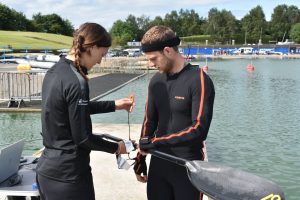
Why did you choose a career in science?
I never really felt like I chose a career – I just kept doing what I liked most and kept asking questions! Apparently as a grown up that makes me a scientist…
Which three qualities do you think have most helped you succeed in your career?
Curiosity, empathy and drive.
What is your proudest moment or achievement?
Finishing my PhD alongside working or being asked to be the primary support for two athletes in the lead up to Rio 2016.
What advice would you offer a young person aspiring to follow in your footsteps?
Find a way to volunteer in what you would like to do- be it a local club, your school or university- you will learn a lot about communication and impact as well as about sport science and there are often simple ways to collect data (especially with a smartphone!).
Dr Claire Williams, Senior Biomechanist & Performance Analyst with British Gymnastics
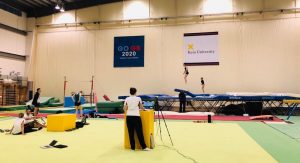
Why did you choose a career in science?
I have always been captivated by the pursuit and application of knowledge and how this influences our ever-changing understanding of the world around us.
Which three qualities do you think have most helped you succeed in your career?
(in no particular order) Passion, professionalism and positive problem solving.
What is your proudest moment or achievement?
Being part of the journey up to and supporting the GBR Trampoline Team at the World Championships 2019 in Japan. It was an important event in terms of qualifying an Olympic place ahead of Tokyo 2020 (needed to finish in top eight of a high-quality field). There was increased pressure due to the success of the previous Olympic Cycle – winning our first ever GBR Olympic Medal in Trampoline in Rio 2016. On a personal note, I had just returned from maternity leave five months prior to the World Championships, so needed to get up to speed in my role (which had evolved whilst I was away) as well as come to terms with the logistical challenges, feelings of excitement/guilt and the unknown of being a working mum.
What advice would you offer a young person aspiring to follow in your footsteps?
It’s great to have career goals but I would encourage every individual to enjoy the journey. I have gained the greatest joy and sight personally and professionally from the small moments. These moments can often be missed in the drive and determination for success.
Naomi Stenhouse, Head of Performance Innovation at the EIS
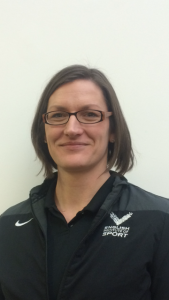
Why did you choose a career in science?
I enjoyed lots of different subjects at school but was always drawn to maths and science slightly more than the arts. I also like to understand why and how things work. This led me to choose an engineering degree at university as the best combination of all those traits. At one point, I quite fancied being a pilot but was worried about being couped up in a cockpit on long flights without being able to move around (sport and activity being my other loves) so went the engineering route instead. I did a Year in Industry between 6th form and university and worked in a steel works in Sheffield for the year. I enjoyed it so much that I worked for them in my summer holidays and then again when I graduated. A few years later, an opportunity came up to work in sport with an engineering focus and I’ve never looked back!
Which three qualities do you think have most helped you succeed in your career?
Being solution-focussed, being open to new opportunities and doing things I enjoy!
What is your proudest moment or achievement?
In my role in the Performance Innovation team at EIS we are privileged to support athletes in following their Olympic and Paralympic dreams. I’m always very proud to have been one small part of the jigsaw that makes their journey.
What advice would you offer a young person aspiring to follow in your footsteps?
Be inquisitive – don’t be afraid to ask the naïve questions: the answers will not only help you understand but it might also spark something in others. There have been many times during projects I have worked on where a simple question, asked in the right way, has unlocked a much better solution.
Amber Luzar, MSc BSc, Lead Performance Analyst & Technical Lead at England and GB Hockey
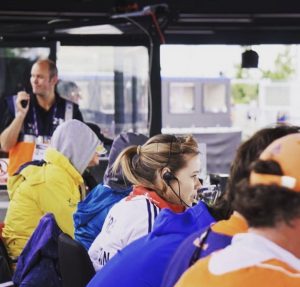
Why did you choose a career in science?
It’s forever evolving, with new concepts and ideas which provide a constantly challenging environment to keep you on your toes. There is something about that curiosity and competitiveness to find innovative ways to give your team an advantage over the rest of the world that is incredibly exciting and rewarding. Being part of something far bigger than yourself and working with some of the best in the business certainly means there never a boring day in the office.
Which three qualities do you think have most helped you succeed in your career?
Drive, integrity, dedication.
What is your proudest moment or achievement?
Being part of the team that won gold at the Rio 2016 Olympics was probably the biggest achievement of my career. However, one of my biggest highlights on a purely personal level was during the 2017 Europeans where we won a Bronze medal. Often analysts miss out on the team huddles and on pitch celebrations, as we will be up a video tower, and then fighting the crowds to get access to the pitch. The players and staff had all received their medals and media had arranged the squad for photos and interviews. You can see on the broadcast footage that our team captain steps out of the group, looks around, and then runs back to ask for another medal. Commentators were questioning what was happening but when I finally made it to the pitch, she put the medal around my neck and the whole team hugged me. In the height of celebration, media requests and the whole host of things going on in that moment, the squad had the awareness that I wasn’t there and valued me enough to ensure they waited to celebrate that moment with me – I felt so valued and respected and it’s one of my favourite video clips. Creating this type of relationship with people, helping them succeed which in turn supports your own success, are one of the many reasons why working in elite sport is just incredible.
What advice would you offer a young person aspiring to follow in your footsteps?
If it’s what you really want to do for a living, don’t give up. Accept that there will likely be doors shut on you and applications not answered along the way but move forward in the knowledge that these hic ups happen to most of us. And perhaps at times you may feel like you have to keep working a bit harder, prove that little bit more to get noticed but in the long run that will serve you in far greater stead to really unleash your potential by learning from these situations and continuing to develop yourself. The harder the battle, the sweeter the victory, and nothing worth having is easy to get.
Laura Needham, Co-Head of Physiology at the EIS and Senior Physiologist at British Triathlon
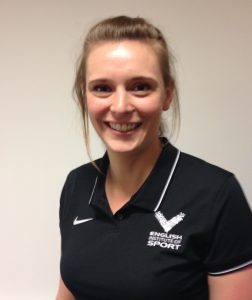
Why did you choose a career in science?
The human body never ceases to amaze me, and continues to do so…I find it fascinating!
Which three qualities do you think have most helped you succeed in your career?
Care about people first, connect and build trusting relationships. The industry is about working with people. Continued passion and desire to always learn and understand.
What is your proudest moment or achievement?
I am really proud to be Co-Head of Physiology at the EIS – I have always been passionate about the physiology discipline and it is amazing to be part of a team of great practitioners.
What advice would you offer a young person aspiring to follow in your footsteps?
Always ask yourself, so what? When you are leaning about sport science at the end think about what this would mean to a coach and/or athlete and what would you choose to do?
Dr Stephanie Blair, Performance Analyst / Biomechanist at British Cycling and the English Institute of Sport
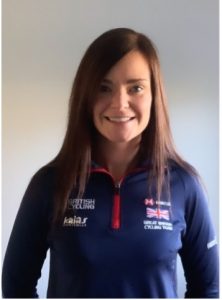
Summarise your job/describe what you do.
I work as a Performance Analyst/ Biomechanist within the Great Britain Cycling Team. I specifically work with our Paralympic squad, which covers both track and road cycling athletes. In my role, I work alongside coaches to evaluate our athletes’ cycling mechanics to help improve aspects of technique and performance. Aerodynamics plays a key role in cycling and a big part of my role involves optimising athlete’s position and bike set-up to reduce aerodynamic drag. As part of my analyst role, I monitor and analyse performance data (training and competition) to provide meaningful insights to coaches and support staff on how we can positively impact and improve performances.
Who or what inspired you into your field?
Growing up I was always interested and involved in sport, and I knew I wanted to pursue a career in it. It was only until I had my first biomechanics lecture at Liverpool John Moores University that I knew it was this aspect of sport that I wanted to be involved in, as it fascinated me.
What is your proudest moment or achievement?
I am really proud of my contributions to some of our innovation projects at British Cycling within the Paralympic squad. Knowing that these projects could help give us the cutting edge at the next games is exciting! I am also very proud of the work I did during my PhD. This body of work increased our understanding of important technical characteristics associated with goal-kicking technique in Australian rules football, providing coaching cues to assist with the development of the skill.
What advice would you offer a young person aspiring to follow in your footsteps?
Be proactive – there are many opportunities out there. People are often more likely to take a chance on you if you’ve actively sought them out and shown interest. Even if they can’t give you a chance, they probably know someone who can.
Ruth Beale, Performance Innovation Consultant
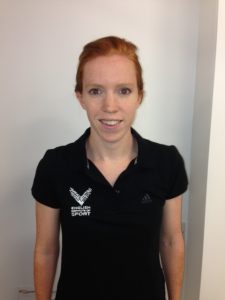
Why did you choose a career in science?
I studied science initially [Ruth studied for an undergraduate degree in physiology before undertaking a Masters in neuroscience], but I actually chose a career in performance sport. I find it so inspiring to see brave people competing at the top level and I saw a way to use science to support that. For me, it’s about performance, supporting athletes and coaches to do amazing things and when we can use science, that’s a win-win for me.
Which three qualities do you think have most helped you succeed in your career?
Empathy – the most important thing we can do is listen to people and understand how we can help them. Science is nothing on its own, you have to be able to use it and apply it to solve real world problems. That requires some serious listening.
Future thinking – being able to consider what the future might look like and work out how we can get ahead of the opposition
Creativity – it’s not the way science is generally taught, but when you get into the applied world and particularly innovation, you have to be creative with what you might be able to do and where you might be able to go in the future.
What is your proudest moment or achievement?
I think that any time that a coach or athlete thanks you and says you’ve contributed something, I feel pride.
That could be having spent over a year working with gymnastics on their performance planning and getting good feedback from the coaches and athletes that it moved the programme on, or it could be a few hours spent working with a swimming coach who has said thank you, that has really helped.
The scale doesn’t matter, if ultimately you’ve added something to people’s work, journeys and lives, that makes me proud.
What advice would you offer a young person aspiring to follow in your footsteps?
Be patient (not always my strong point!). It’s all about time, patience and being on the ground. You have to understand the people that are in front of you, their motivations, their desires, their needs, what really gets them going, because at the end of the day, they’re the ones that are going to deliver a medal. You can only help them if you’re completely aligned to what they need.